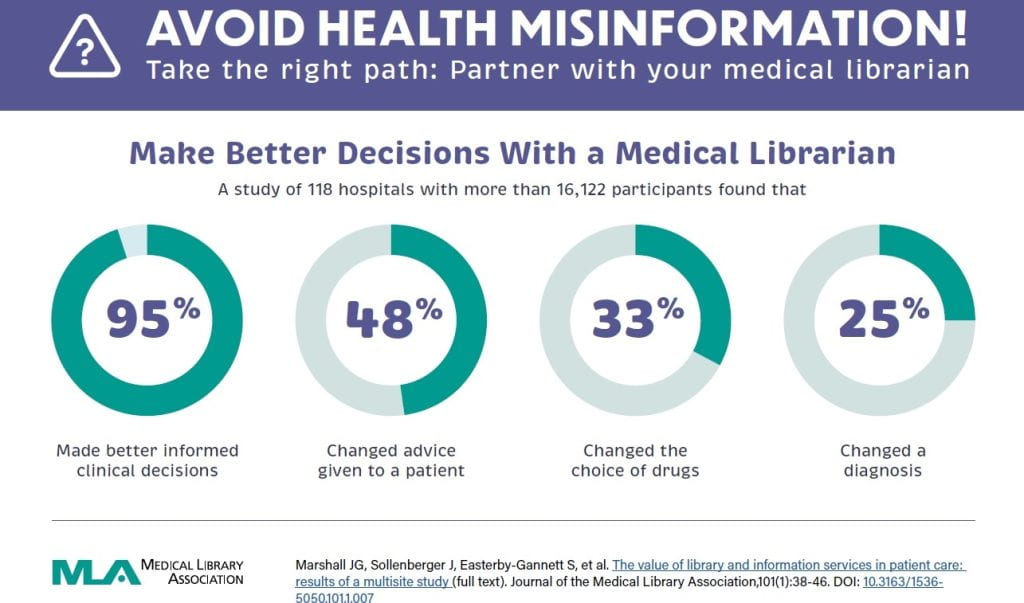October is National Medical Librarians Month! This year’s theme is Avoid Misinformation! Take the Right Path: Partner with Your Medical Librarian. The Medical Library Association is raising awareness of the value health sciences librarians bring to clinical information needs. Health sciences librarians can find the best evidence to answer your questions.

In 1992, the landmark “Rochester Study”1 demonstrated a relationship between information services provided by health sciences librarians and improved patient outcomes. The study sampled a group of 448 physicians in the Rochester, NY area. 80% of the 208 physicians who returned their questionnaires said that they probably or definitely changed some aspect of patient care based on information received from a hospital librarian. The National Network of Libraries of Medicine (NN/LM) sponsored a follow up study whose results were published in 2013.2 Focus groups, surveys, and phone interviews gathered input from physicians, residents and nurses from 118 hospitals about a recent incident in which they had sought information for patient care. The key findings were:
Library and information resources were perceived as valuable, and the information obtained was seen as having an impact on patient care.
Electronic access to information resources from multiple locations has increased the ability of health professionals to use these resources for improved patient care.
The roles of librarians are diversifying to include management of electronic resources, user instruction and support, specialized research and clinical information search services, and involvement in institution-level quality improvement.
Marshall et al. (2013)
A similar 2016 study conducted in the UK measured clinical librarian’s impact on patient outcomes. It found a wide range of positive interventions including “direct contributions to choice of intervention (36%) diagnosis (26%) quality of life (25%), increased patient involvement in decision making (26%) and cost savings and risk management including avoiding tests, referrals, readmissions and reducing length of stay (28%).”3
Librarians at Himmelfarb are all well versed in the principles of evidence-based practice. Many are expert searchers, with advanced training on databases like PubMed and Scopus. Our reference team has years of experience conducting systematic reviews and other in depth searches. When you have an information need, whether it be for research or patient care, turn to our team of professionals at Himmelfarb Library! You can reach us at himmelfarb@gwu.edu or call 4-1850 or chat with us 8:30am to 5:00pm Monday through Friday.
- Marshall JG. The impact of the hospital library on clinical decision making: the Rochester study. Bull Med Lib Assoc. 1992 Apr;80(2):169–78. PMID: 1600426
- Marshall JG, Sollenberger J, Easterby-Gannett S, Morgan LK, Klem ML, Cavanaugh SK, Oliver KB, Thompson CA, Romanosky N, Hunter S. The value of library and information services in patient care: results of a multisite study. J Med Libr Assoc. 2013 Jan;101(1):38-46. doi: 10.3163/1536-5050.101.1.007. PMID: 23418404
- Brettle A, Maden M, Payne C. The impact of clinical librarian services on patients and health care organisations. Health Info Libr J. 2016 Jun;33(2):100-20. doi: 10.1111/hir.12136. Epub 2016 Feb 17. PMID: 26887653.

